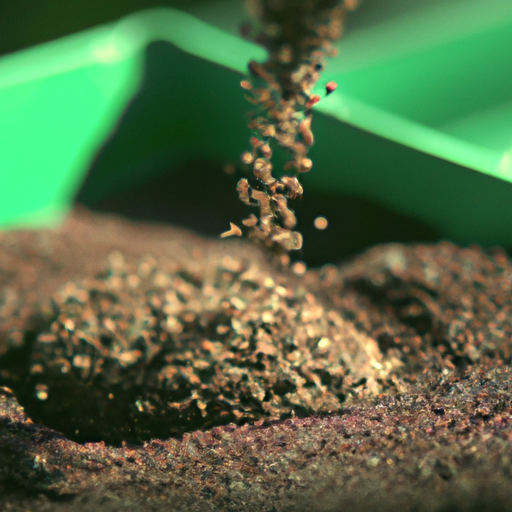-
Table of Contents
- Introduction
- Methods to Make Organic NPK Fertilizer
- Raw Materials for Organic NPK Fertilizer Production
- Organic NPK Fertilizer Production Process
- How to Make Your Own Organic NPK Fertilizer at Industrial Scale
- How to Choose the Right Machines for Organic NPK Fertilizer Making
- Costs to Produce NPK Organic Fertilizer
- Conclusion
“Grow Healthy Plants with Organic NPK Fertilizer!”
Introduction
Organic NPK fertilizer is a great way to provide your plants with the nutrients they need to grow and thrive. It is made from natural ingredients and is free from synthetic chemicals, making it a safe and effective choice for your garden. In this guide, we will discuss the steps involved in making your own organic NPK fertilizer, including the ingredients you will need and the process for mixing and applying the fertilizer. With a little bit of effort, you can create a nutrient-rich fertilizer that will help your plants reach their full potential.
Methods to Make Organic NPK Fertilizer
Organic NPK fertilizer is a type of fertilizer that is made from natural and organic sources, such as animal waste, crop residues, and compost. There are several methods to make organic NPK fertilizer, including composting, vermicomposting, and fermentation. Composting involves mixing organic materials with water and allowing them to decompose over time, resulting in a nutrient-rich fertilizer. Vermicomposting, on the other hand, involves the use of worms to break down organic waste into compost. Fermentation is another method that involves the use of yeast or other microorganisms to break down organic materials into a liquid fertilizer. Regardless of the method used, organic NPK fertilizers are an excellent way to provide plants with the nutrients they need while also promoting soil health and sustainability.

Raw Materials for Organic NPK Fertilizer Production
Organic NPK fertilizer production requires a variety of raw materials in order to create a balanced fertilizer blend. The most common raw materials used in organic NPK fertilizer production are animal manures, compost, green manures, and mineral sources.
Animal manures are a great source of organic matter and nutrients for organic NPK fertilizer production. Manures from cows, horses, sheep, and poultry are all suitable for use in organic fertilizer production. These manures are rich in nitrogen, phosphorus, and potassium, as well as other essential micronutrients.
Compost is another important raw material for organic NPK fertilizer production. Compost is made from organic materials such as leaves, grass clippings, and food scraps. Compost is rich in nitrogen, phosphorus, and potassium, as well as other essential micronutrients. In our factory, there are lots of compost machines to help you make quality compost fertilizer rapidly for your organic npk fertilizer production process.
Green manures are also used in organic NPK fertilizer production. Green manures are plants that are grown specifically for the purpose of adding organic matter and nutrients to the soil. Common green manures include clover, alfalfa, and rye.
Finally, mineral sources are also used in organic NPK fertilizer production. These mineral sources include rock phosphate, potassium sulfate, and limestone. These minerals provide essential nutrients to the soil and help to balance the nutrient content of the fertilizer blend.
By combining these raw materials, organic NPK fertilizer can be produced that is balanced and effective. This fertilizer can then be used to improve soil fertility and promote healthy plant growth.
Organic NPK Fertilizer Production Process
Organic NPK fertilizer production is a process that involves the use of natural materials to create a nutrient-rich fertilizer. This type of fertilizer is beneficial for both plants and soil, as it provides essential nutrients that are necessary for healthy growth. The production process begins with the selection of organic materials, such as animal manure, compost, and plant residues. These materials are then mixed together in a specific ratio to create the desired NPK fertilizer.
Once the materials are evenly mixed with fertilizer blending equipment, they are then placed in a composting bin or pile. This allows the materials to decompose and release their nutrients into the soil. During this process, the organic matter is broken down by microorganisms, which release nitrogen, phosphorus, and potassium into the soil. After the composting process is complete, the fertilizer is ready for use.
The next step in the production process is to mix the fertilizer with water. This helps to ensure that the nutrients are evenly distributed throughout the soil. Then you can make npk organic fertilizer granules with fertilizer granulators. After mixing the necessary ingredients in the right proportions, you can make NPK organic fertilizer granules with fertilizer granulators. These machines function to compress and shape the mixture into small pellets, which are easier to handle and spread evenly over a garden or farm. Granulation also prevents nutrient loss and makes it easier for plants to absorb the fertilizer. NPK organic fertilizer granules provide a balanced supply of nitrogen, phosphorus, and potassium, essential nutrients for plant growth and development. Using organic fertilizers reduces environmental pollution and promotes sustainable agriculture practices. Therefore, using fertilizer granulators to make NPK organic fertilizer granules is an effective way to enhance soil fertility and increase crop yield.
Finally, the fertilizer is tested to ensure that it meets the desired NPK levels. If the levels are not satisfactory, additional organic materials may be added to the mix to increase the nutrient content. Once the desired levels are achieved, the fertilizer is ready for use.
Organic NPK fertilizer production is an important process for maintaining healthy soil and plants. By using natural materials, the fertilizer is able to provide essential nutrients to the soil and plants, while also helping to improve the overall health of the environment.
How to Make Your Own Organic NPK Fertilizer at Industrial Scale
Organic NPK fertilizer is an important component of sustainable agriculture. It is a natural source of essential nutrients for plants, and it can help to improve soil fertility and promote healthy plant growth. Making your own organic NPK fertilizer at an industrial scale can be a cost-effective and sustainable way to ensure your crops receive the nutrients they need.
The first step in making your own organic NPK fertilizer is to source the necessary ingredients. These ingredients will vary depending on the specific NPK ratio you are aiming for, but typically include organic materials such as compost, manure, and green waste. You will also need to source a source of nitrogen, phosphorus, and potassium, such as rock phosphate, potassium sulfate, and urea.
Once you have sourced the necessary ingredients, you will need to mix them together in the correct proportions. This can be done by hand or with a mechanical mixer. The mixture should be homogenous and free of lumps.
Once the ingredients are mixed, you will need to dry the mixture. This can be done in a drum drier or in the sun. The drying process should be done slowly and carefully to ensure that the nutrients are not lost.
Once the mixture is dry, it is ready to be pelletized. This can be done using a extrusion pelletizer or a granulator. The pellets should be uniform in size and shape and should be free of dust and debris.
Finally, the pellets can be packaged and stored for use. It is important to store the fertilizer in a cool, dry place to ensure that the nutrients remain intact.
Making your own organic NPK fertilizer at an industrial scale can be a cost-effective and sustainable way to ensure your crops receive the nutrients they need. By sourcing the necessary ingredients, mixing them together in the correct proportions, drying the mixture, and pelletizing it, you can create a high-quality fertilizer that will help to promote healthy plant growth.
How to Choose the Right Machines for Organic NPK Fertilizer Making
Organic NPK fertilizer is an important part of any successful agricultural operation. It helps to ensure that crops receive the nutrients they need to grow and thrive. When selecting the right machines for organic NPK fertilizer making, there are several factors to consider.
First, it is important to consider the size of the operation. If the operation is small, then a smaller machine may be sufficient. However, if the operation is large, then a larger machine may be necessary. Additionally, the type of fertilizer being produced should be taken into account. Different machines are designed to produce different types of fertilizer, so it is important to select the right machine for the job.
Second, the cost of the machine should be taken into consideration. Organic NPK fertilizer making machines can range in price from a few hundred dollars to several thousand dollars. It is important to select a machine that fits within the budget of the operation.
Third, the quality of the machine should be taken into account. It is important to select a machine that is reliable and durable. Additionally, the machine should be easy to use and maintain.
Finally, the customer service of the manufacturer should be taken into consideration. It is important to select a manufacturer that is willing to provide support and answer questions. Additionally, the manufacturer should be able to provide spare parts and other necessary items in a timely manner.
By taking all of these factors into consideration, it is possible to select the right machines for organic NPK fertilizer making. Doing so will help to ensure that the operation is successful and that crops receive the nutrients they need to grow and thrive.
Costs to Produce NPK Organic Fertilizer
Producing NPK organic fertilizer requires a significant investment of both time and money. The cost of production depends on the type of fertilizer being produced, the size of the operation, and the quality of the raw materials used.
The first cost associated with producing NPK organic fertilizer is the cost of the raw materials. These materials include organic matter such as compost, manure, and other organic waste products. The cost of these materials will vary depending on the quality and availability of the materials. Additionally, the cost of the NPK fertilizer itself must be taken into account.
The second cost associated with producing NPK organic fertilizer is the cost of the equipment needed to produce the fertilizer. This includes items such as mixers, blenders, and other processing equipment, like drum granulators, driers, coolers, belt conveyors, and fertilizer bagging equipment, etc.. The cost of this equipment will depend on the size of the operation and the quality of the equipment.
The third cost associated with producing NPK organic fertilizer is the cost of labor. This includes the cost of hiring workers to mix and process the fertilizer, as well as the cost of training and supervising these workers. The cost of labor will vary depending on the size of the operation and the skill level of the workers.
Finally, the cost of packaging and shipping the fertilizer must also be taken into account. This includes the cost of packaging materials, as well as the cost of shipping the fertilizer to its destination.
In total, the cost of producing NPK organic fertilizer can range from a few hundred dollars to several thousand dollars, depending on the size of the operation and the quality of the raw materials used. It is important to carefully consider all of these costs before investing in an NPK organic fertilizer production operation.
Conclusion
Organic NPK fertilizer is an excellent way to provide your plants with the nutrients they need to grow and thrive. It is easy to make, cost-effective, and can be tailored to the specific needs of your plants. With a little bit of research and experimentation, you can create a fertilizer that will help your plants reach their full potential.

